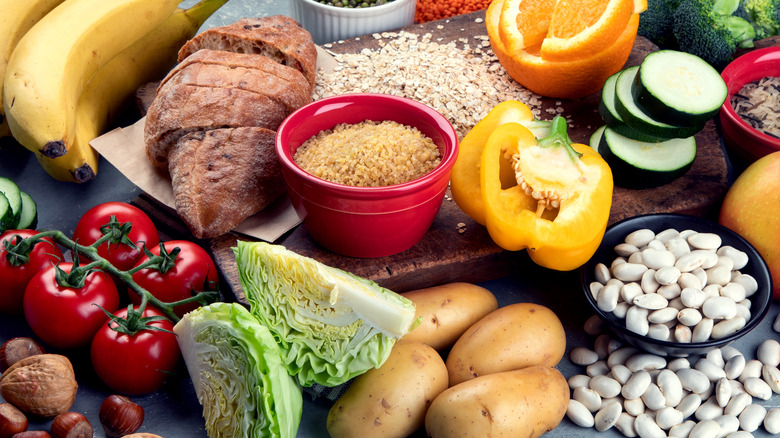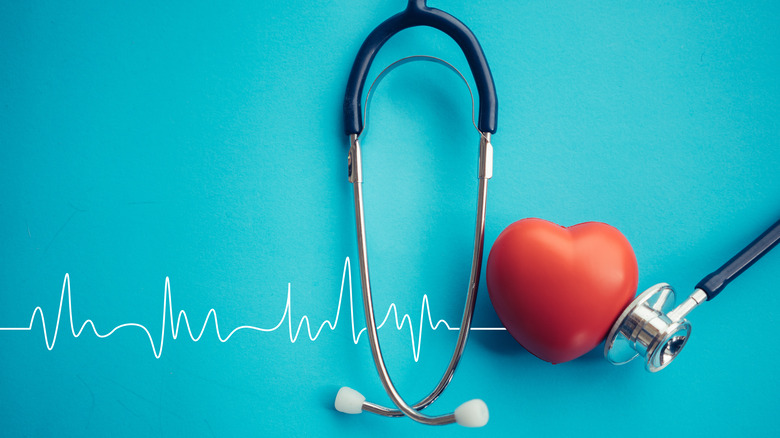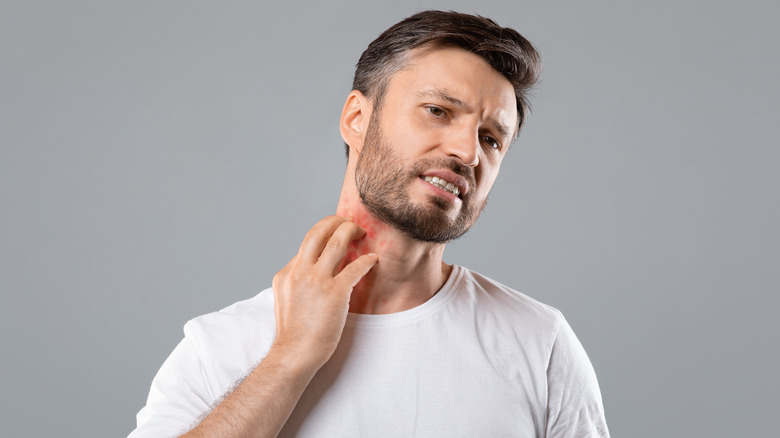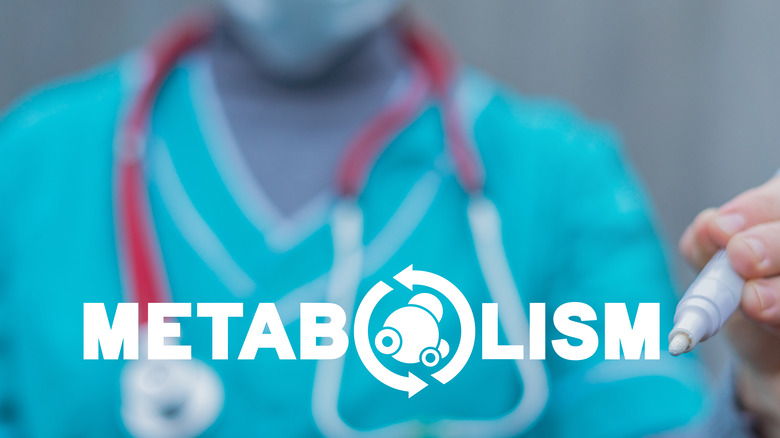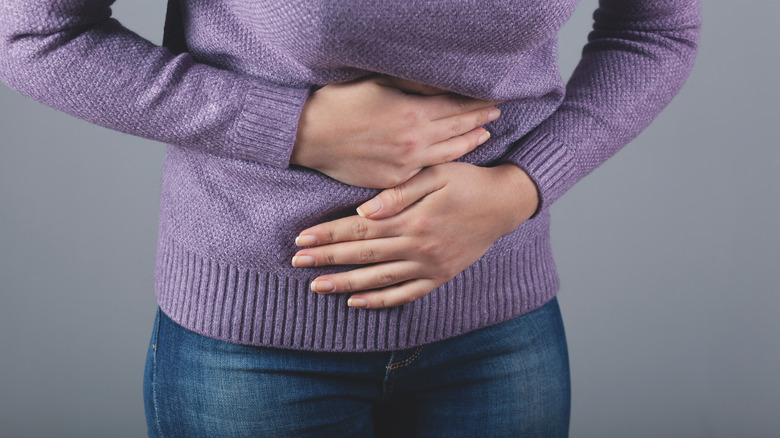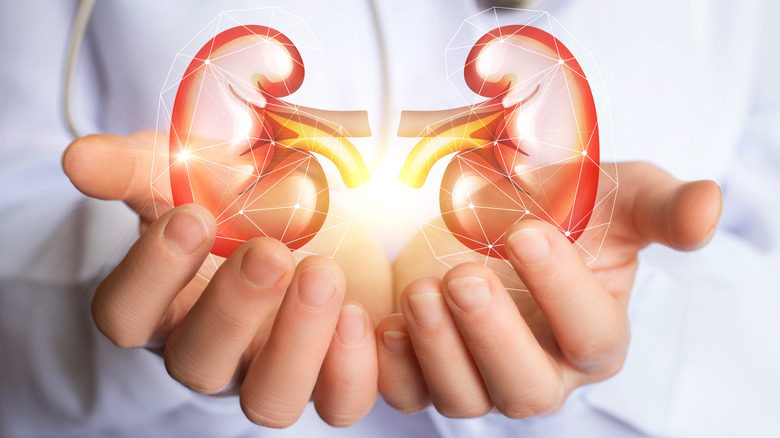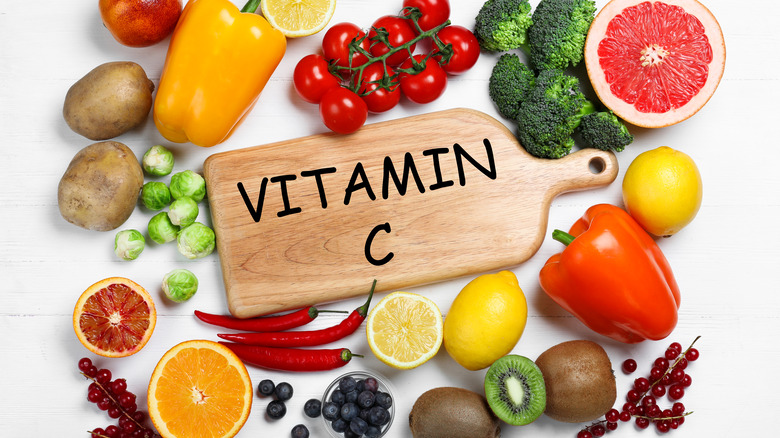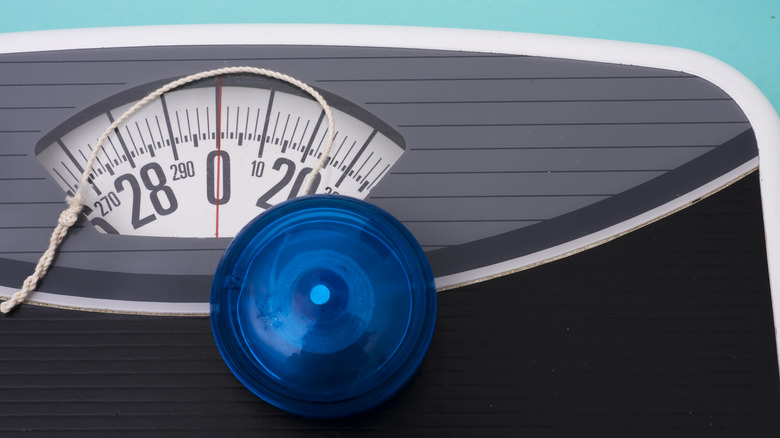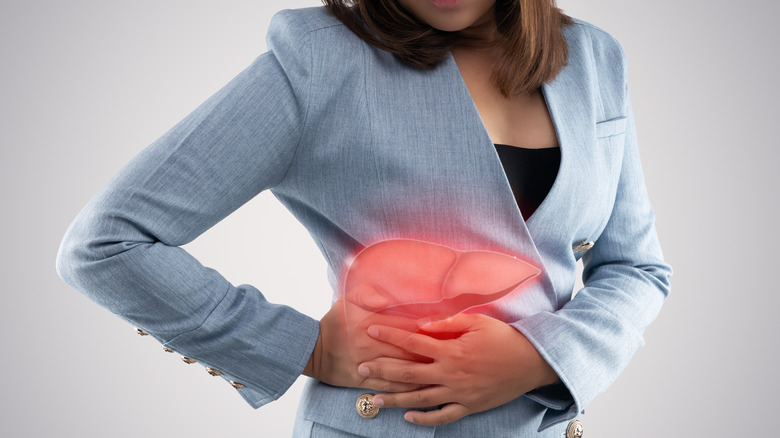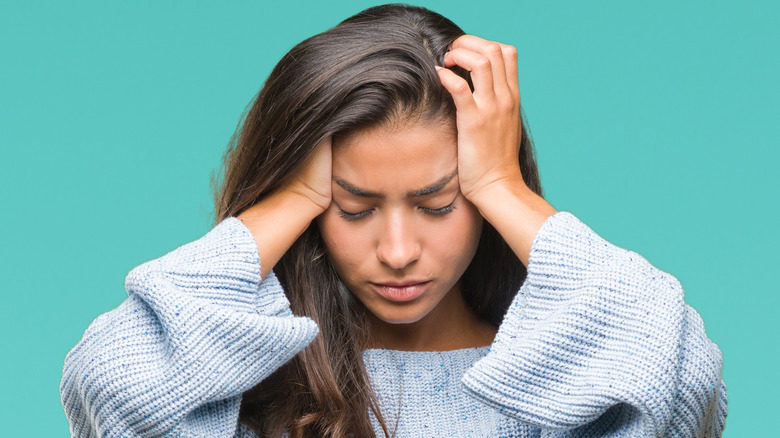You're Not Eating Enough Carbs If This Happens To You
When it comes to dieting, the first thought most people have is to cut out the carbs. And in a way, this makes sense. After all, cakes, cookies, and other sugary goodies are loaded with carbs, and are, in general, considered dieting no-nos. But is there a downside to this low-carb focus?
Before we dive into this, it's important to understand how low-carb diets work. To demonstrate, we're going to examine one of the most stringent of these carb-cutting plans: the keto diet. Its name is short for the word "ketosis," which, according to Healthline, is a metabolic state that can happen when you either stop eating carbs or eat very few carbs. Since your body normally relies on burning carbs for energy, consuming less of them forces your metabolism to switch gears and start burning fat instead. This is primarily how the keto diet (and to varying degrees some other low-carb diets) may help people lose weight.
Now, let's be clear. All diet plans have their potential pros and cons. But before you embark on any type of low-carb diet or start cutting carbs on your own, it's important to know how this approach might impact you. That way you and your health care professional can make the best possible choice for your needs and fitness goals.
You could shorten your lifespan
Now that's a scary thought. Nevertheless, one study found that its participants who regularly ate fewer carbs were more likely to die from a stroke, a form of cancer, or heart disease within six years of the time of the study (via WebMD). To be fair, the study wasn't to definitively state that low-carb lifestyles were responsible for this outcome. However, the FDA says eating fruits (which are loaded with carbs) and vegetables (which in some cases have carbs) may decrease the chances of having a stroke or a heart attack. And the research doesn't stop there.
A different study found connections between carbs and a person's lifespan (via WebMD). Interestingly enough, the participants who consumed some carbs tended to live longer than those who consumed either high amounts or low amounts of carbs. Dr. Maciej Banach, the study's lead researcher, said that while low-carb diets could help with managing your blood sugar, blood pressure, and weight, it may be detrimental if done in the long term.
So, does this mean not eating carbs is dangerous? More research is needed, but if you are considering a low-carb diet, you should ask yourself if you're at risk for a stroke, heart disease, or cancer. Do you have a family history of any of these diseases? If the answer is "yes," then you should definitely speak with your health care professional.
You may develop a rash
A rash isn't the most common thing that can happen if you go low carb (via Medical News Today). With that said, people who are on the keto diet have reported unpleasant, itchy rashes typically on their necks, chests, and backs often enough that the condition has been dubbed the "keto rash." And although it's still not clear why this happens, speculation is the rash can be a side effect of putting your body into ketosis, especially since it usually goes away if the person starts eating carbs again.
Findings of how many people actually have had the keto rash are, well, a bit complicated. Up until 2011, there were only 40 reported cases of keto rash outside of Japan, which has had the highest number of reported cases (via Medical News Today). However, that could be because doctors who practice Western medicine might not have been as familiar with the ailment and so reported the keto rashes as something else.
If you are one of the unlucky ones who develop the keto rash, don't worry, there are things you can do. According to a report in the Hawai'i Journal of Medicine & Public Health, antibiotics like doxycycline or minocycline might help with the rash's symptoms. You can also wear loose-fitting clothes and not use strong detergents on laundry day. Finally, avoid touching the rash, and when you wash it, don't rub it, per Medical News Today.
You might lose muscle mass and slow down your metabolism
If you're not eating as many carbs, then what are you eating? Well, with the keto diet, for example, the majority of your meals are made up of around 70 to 80% fat and roughly 20% protein (via Health). And this level of fat consumption can have side effects.
As Health explained, eating more fat than protein can lead to losing muscle mass. "You'll lose weight, but it might actually be a lot of muscle," Dr. Kristen Kizer, registered dietitian, explained. She continued, saying, "And because muscle burns more calories than fat, that will affect your metabolism." Remember, when choosing a diet plan you need to consider how it will impact your metabolism both in the short and long term. After all, your body will continue to change, and you might not be able to stay on a low-carb diet forever.
And that brings us to the bad news. If you stop following a low-carb diet that emphasizes eating fat, you'll probably gain back some — if not all — of the weight you lost (via Health). When someone stops following the keto diet, they're more likely to gain back weight as fat instead of as muscle. "Now you're back to your starting weight, but you no longer have the muscle mass to burn the calories that you did before," Dr. Kizer noted. "That can have lasting effects on your resting metabolic rate, and on your weight long-term."
Bad breath and going low carb is not a myth
There's a ton of misinformation out there about diets, so not surprising that people are skeptical about a certain low-carb diet giving you bad breath. But as much as sounds like another internet rumor, keto breath is a real thing (via Medical News Today).
So, why does this happen? When your body is put in a state of ketosis, your cells release fat for energy. These fats are turned into molecules called ketones. However, even when your body successfully puts itself in ketosis, it still needs time to adjust to this new metabolic state. In the meantime, you might be breathing out ketones, which is what can give you that infamous breath. And how bad is it? According to a report in the International Journal of Environmental Research and Public Health, some people say keto breath is fruity.
The good news is as your body learns to process the ketones better, you won't breathe them out as much, and your "fruity" breath should become less if not disappear altogether (via Medical News Today). The bad news is that it could take 21 days or more, per a report in the Journal of International Society of Sports Nutrition. Of course, introducing more carbs into your diet can help get rid of keto breath, but this can be tricky with very strict low-carb diets like the keto diet. If you're looking for a non-carb option, upping your water intake can also help by flushing ketones out of your body.
Eating fewer carbs could cause constipation and diarrhea
Of course, what we eat and drink can impact our digestive health — and low-carb diets are no exception. In particular, there are concerns that carb-cutting weight management plans like the keto diet, which eliminate foods like fruits and whole grains, also reduce sources of natural fiber (via Everyday Health). And this can have negative effects on your colon.
Dr. John Riopelle, a gastroenterologist, told Everyday Health, "Fiber is important for colonic health." When highlighting how the body functions, he said, "I explain to patients that the primary job of the colon is to be a sponge and absorb all the water you've consumed and fluids secreted during the digestive process. Fiber adds bulk to the stool and helps the colon work like a muscle to move things through [more easily]."
So, the connection between fiber and constipation seems obvious, but what about the opposite condition: diarrhea? Well, according to Everyday Health, you're more likely to have constipation than diarrhea on low-carb diets like the keto diet. However, such diets can lead to additional fat in your stool, which can cause diarrhea. As Dr. Riopelle told the site, as your body adjusts to fewer carbs and more fat, it might not properly digest all the fat consumed. "If fat doesn't get broken down in your small intestine the way it's meant to," he said, "it travels into your colon and activates bacteria that can lead to gas, bloating, and fat in the stool."
You're more likely to tax and damage your kidneys
People who go low carb tend to replace their carbs with either protein or fat. As such, it's not surprising that sometimes people will turn to high-fat foods made from or produced by animals. These can include not just meat but also cheese and eggs (via Healthline). Unfortunately, these types of foods can be rough on your kidneys.
As Healthline explained, animal foods consumed in large amounts may impact both your blood and your urine by making both more acidic. This can lead to higher amounts of calcium in your urine, which is what can put a strain on your kidneys. Plus, when your body is in ketosis like it's supposed to be on some low-carb diets, it might also lower how much of a compound called citrate is in play as your body processes food (via Healthline). And unfortunately, citrate usually helps protect your kidneys against developing stones by binding to calcium. So between the higher amounts of calcium and the lower amounts of citrate, your kidneys could be at risk.
In addition, consuming more protein is not good for someone with chronic kidney disease since they are supposed to cut down on their protein intake (via Healthline). So, if you already have this disease, know that going on a low-carb diet could make your condition worse. If you have any kidney issues at all, you should keep a food journal and share it with your health care professional.
You may be eliminating more than just sugar
Some low-carb eating plans, like the keto diet, require all but eliminating 5% of the carbs from your diet (via Health). But is this a good idea? After all, there is a world of difference between an apple and an apple strudel. Okay, that's an extreme example, but it does demonstrate how foods that fall into the carbohydrate category can be very different in terms of their health benefits.
As registered dietitian Annette Frain told Health, foods like fruits and vegetables are loaded with vitamins, minerals, and antioxidants. "If you eliminate those [fruits and vegetables], you aren't getting those nutrients over time," she explained. The FDA lists vitamin C, potassium, and folate as just a few of the vitamins and minerals found in fruit. The FDA also states on their website that "people who eat more fruits and vegetables as part of an overall healthy diet are likely to have a reduced risk of some chronic diseases."
Besides fruits and vegetables, if you cut out whole grains as part of a low-carb diet, you're also cutting out a major source of fiber, which is essential for digestive health, as well as avoiding problems like high cholesterol and blood pressure (via Healthline). Plus, reducing your fiber intake can actually lead to gaining weight, the exact opposite of the goal of low-carb diets. Bottomline: While refined carbs may be detrimental to your health, others (healthy carbs) have important nutrients for your overall health.
Restricting carbs can lead to yo-yo dieting
Okay, it's time for a hard truth. The more restrictive a diet, the more likely you'll wind up yo-yo dieting, an unhealthy cycle of going back and forth between strictly watching what you consume and binge eating, registered dietitian Juliana Shalek told Women's Health. And as she explained, diets that restrict carbs usually lead to not just binging but very counterproductive binging. "I'll have people that lost 12 to 15 pounds initially and then when they started incorporating those carbs, they gained that back plus some," she said.
Unfortunately, there are some more significant issues than gaining back weight (via Women's Health). While the term "binging" is used in a lighthearted way to describe watching a number of TV show episodes in a row, a history of binge eating is a serious matter. It can be taxing on your health, and if you already have a tendency towards doing it, then restrictive eating plans like some low-carb diets could push you towards repeating those potentially detrimental habits.
If you have a tendency to binge eat or have found restrictive diets have not worked for you, you may want to consider a different approach. Dr. Matthew Weiner, a bariatric surgeon, advised against excluding a whole food group, like carbs, from your diet. Instead, he recommends cutting out specific members of a food group — like processed foods — and consuming whole foods, which include whole grains, fresh berries, fruits, and vegetables (via WebMD).
Does it help with or cause brain fog?
This one is a bit tricky. But first, what exactly is brain fog? As WebMD revealed, it's not actually a medical condition. Instead, it refers to symptoms in which you have difficulty thinking and trouble focusing. While many things can bring on brain fog like chemotherapy, pregnancy, menopause, and multiple sclerosis, cutting the carbs from your diet could either reduce it or make it worse.
How is that possible? Well, let's start with how cutting carbs could get rid of brain fog. According to Prevention, carbs can cause your blood sugar to go up and down. This is especially the case with refined carbs like the kind in pasta, sugary drinks, and some cereals. These blood sugar spikes and dips can cause brain fog, so cutting refined carbs out of your diet like you would on a low-carb diet can reduce the severity of these spikes and dips and help clear your mind and improve your focus.
But not so fast. As registered dietitian Laura Iu told Prevention, "Our brains need the right type of carbohydrates for energy, and someone who is following a low carb diet may not have enough of these carbs, which can contribute to brain fog and difficulty concentrating." Furthermore, the Ohio State University Wexner Medical Center revealed carbs "that are high in fiber and in their natural form" can provide fuel for our brains and protect our brain cells from stress and pollution.
Do you have the flu or the carb flu?
The keto flu, or carb flu, happens when newcomers to a restrictive low-carb diet like the keto diet experience symptoms such as headaches, muscle cramps, difficulty concentrating, pain in their stomach, sleeping issues, vomiting, diarrhea, and constipation (via Healthline). Although carb flu's severity varies from person to person, it can happen within days of starting a low-carb diet.
Before you get completely turned off any low-carb lifestyle, keep in mind that there's a reason for the "keto" in "keto flu." Even though ketosis is a natural metabolic state, it initially can be rough on your body (via Healthline). In fact, this shift from burning carbs to burning fats for energy can feel like a form of withdrawal, which is why craving sugar is another symptom of it. While the keto diet may cause these side effects, a more moderate low-carb diet may not have as many or any of these symptoms.
Fortunately, if you're already experiencing carb flu, there are ways to deal with it. As Healthline recommended, make sure you drink enough water since strict carb-cutting plans like the keto diet can cause your body to get rid of water more quickly. Also, consume enough electrolytes, and if you're on the keto diet, you may want to do this by eating avocados and leafy green vegetables. Finally, make sure you get enough sleep and go easy on your workouts.
Exercising may become harder
Dieting and exercise go hand in hand for sustainable weight management. With that said, low-carb diets like the keto diet can actually make working out harder rather than easier. As Andy Galpin, an associate professor of kinesiology at California State University in Fullerton, told Everyday Health, "We have very little evidence that says the ketogenic diet is better for anything exercise-wise."
The important thing to keep in mind here is that your body uses carbs for high-intensity workouts (via Everyday Health). Your muscles store carbs and then call upon them to fuel activities like sprinting and strength training. Fat, on the other hand, is harder for your body to burn than carbs so, as Galpin explained, your workout may suffer. "[The keto diet is] not going to be any better for physical performance than the standard diet," he said.
Okay, but what about workouts that are less intense like yoga or walking? Well, according to Everyday Health, reducing your carbs would probably have less of an impact on lower-intensity workouts than high-intensity ones. In fact, Healthline recommends opting for less intense workouts if you're still adjusting to the keto diet and experiencing carb flu. However, Galpin said the keto diet, in particular, is not a diet he would advise to anyone looking to improve their overall workout performance no matter what type of exercise you choose. If you're looking to go low carb, you need to consider what type of exercise plan you want to either start or continue doing.
You might experience problems with your memory
We all have memory lapses. We forget where we left our keys. We experience tip-of-the-tongue moments, trying to recall someone's name. But if you cut down on your carbs, you could experience more forgetfulness than usual.
One study found that participants who went on a very restrictive low-carb diet for one week did notably worse on a memory test than the participants who went on a high-carb diet (via WebMD). Once the low-carb group started consuming carbs again, their memories improved. The study's co-author, Dr. Holly A. Taylor told WebMD, "This study demonstrates that the foods we eat can have an immediate impact on brain function."
While the keto diet focuses on converting fat into energy, it's not the only option for going low carb. You could just as easily decide to eat more protein than fat and turn the protein into your new energy source. But this is where you may experience memory issues. As WebMD explained, both carbs and proteins can be converted into fuel for your brain, but the carbs are the more efficient fuel choice, which might impact your brain's overall functionality. While more research is needed on this subject, you may want to bring up your low-carb diet to your health care professional if you're experiencing memory problems.
Cutting carbs could cause liver damage
Oftentimes when we think of things that negatively affect the liver, our first thought is alcohol, especially since giving up alcohol can give your liver a chance to repair itself. However, cutting back on carbs can also have a harmful impact on this important organ.
A 2020 study found that the keto diet can cause higher levels of liver enzymes and that rodents put on this diet developed nonalcoholic fatty liver disease. As the name suggests, this disease is defined by too much fat stored in the cells of the liver (via Mayo Clinic). It's also worth noting that the keto diet requires consuming higher levels of fat, which means more fat for your liver to process and turn into ketones.
Although a person may have no symptoms and still have nonalcoholic fatty liver disease, they also may experience pain in their upper right abdomen, as well as fatigue (via Mayo Clinic). In addition, it can lead to a condition called cirrhosis in which there is scarring inside the liver. And once your liver is at this point, you're not only more likely to develop liver cancer, but your liver may simply stop functioning altogether. To reduce your chances of developing the disease, the Mayo Clinic recommends eating a "healthy plant-based diet." This includes carb-rich foods like whole grains and fruits. However, it also says healthy fats and vegetables are also beneficial.
You may experience headaches
In general, headaches seem to be a side effect of restrictive low-carb diets like the keto diet, especially in the very beginning when your body is still adjusting to your new eating regimen (via Medical News Today). These headaches may occur for just a day or they may continue for a week or longer. As Medical News Today explained, this reaction could be due in part to dehydration.
The keto diet, in particular, causes your body to expel your water reserves, which, of course, can cause dehydration (via Healthline). However, there are other possible low-carb-related culprits for these headaches. Medical News Today cites a lack of balance in your electrolytes as a possible cause of headaches. This could be in part because restrictive low-carb dieting can cause changes in insulin levels, which can cause more sodium to be released into your body (via Healthline). This additional salt can throw off your electrolyte balance. Even setting these two factors aside, simply cutting carbs and sugar from your diet alone is enough to trigger a headache in some people (via Medical News Today).
If you are experiencing headaches because of the keto diet, Healthline recommends staying hydrated and choosing keto-friendly foods that will naturally help keep your electrolytes balanced. And if you are unable to get rid of your headaches, talk to your health care professional.

